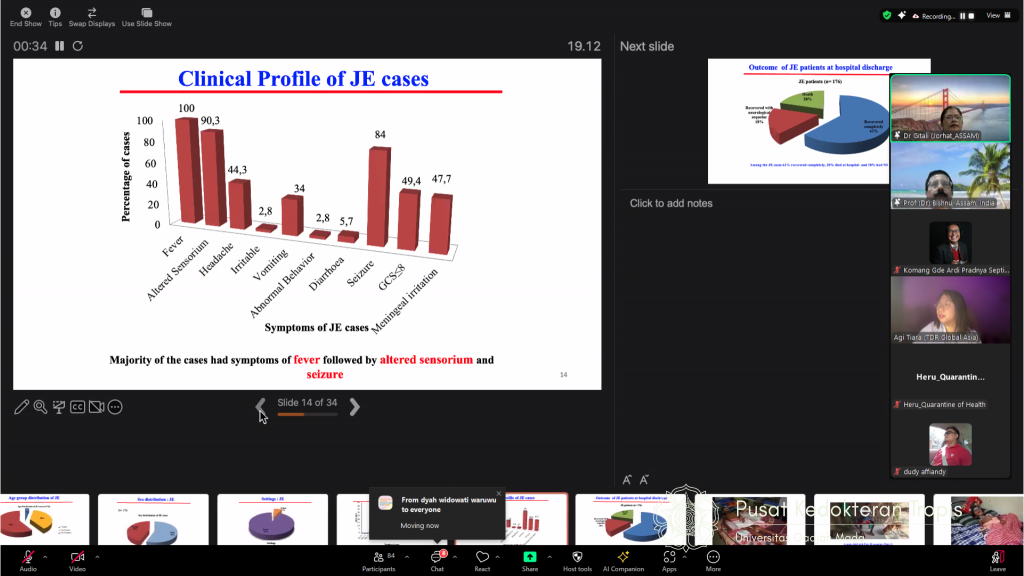Understanding JE: How Ecology Impacts Japanese Encephalitis Spread in Agricultural Areas
Japanese Encephalitis (JE) remains one of the serious health challenges, particularly in the Asia and Pacific regions. In Northeast India, for example, this disease continues to be a significant threat, especially in agricultural areas where Culex mosquitoes breed. The high number of JE cases found in this area point out the vulnerability of the locals to this disease, thereby requiring special attention in its control and prevention efforts.

In response to this, Center for Tropical Medicine UGM collaborated with TDR Global Asia organized a webinar titled “Ecological Insights into Japanese Encephalitis in North-East India” on Wednesday, August 21, 2024. This online event, hosted by the Center for Tropical Medicine UGM together with TDR Global Asia, was attended by approximately 100 participants from various fields of research. This event was held via Zoom at 7:00 PM (GMT+7), presenting two main speakers: Dr. Gitali Kakoti and Prof. Bishnu Ram Das from Jorhat Medical College. The webinar aimed to explore the ecological factors influencing JE transmission as well as to facilitate knowledge exchange and collaboration among the participants.
On this occasion, Dr. Kakoti presented the current JE situation, particularly its impact on children and adolescents, as well as its economic implications for families in Northeast India. “Most of the families became bankrupt following the acute episodes of illness,” said Dr. Kakoti. “The cost of illness would be a burden to JE-afflicted families,” she added. Thus, there are multidimensional implications when someone is infected with JE.
Meanwhile, Prof. Bishnu Ram Das discussed the epidemiology of JE and strategies for its prevention and control, emphasizing the crucial role of ecological factors in the transmission of this disease. “Identification of risk factors for JE infection would help in setting guidelines as well as generating awareness regarding the prevention and control of JE infection among the general population,” he emphasized. Ending the presentation there is an interesting finding regarding vector-control. Though in some other mosquito-borne diseases this method is proven effective, it did not give any significant impact in terms of JE control. “Vaccination is currently a key support in JE control,” said Prof. Das concluded his presentation.
Following presentations from Dr. Kakoti and Prof. Das, the discussion session began. The enthusiasm of the participants was evident by the questions raised on the session. One such participant was Sylva Haryosaputro, who asked, “Is there any disparity in accessing the vaccine between southern and northern India?”. Another participant, Florisma Arista Tegu, inquired about the monitoring and evaluation strategies used to assess the effectiveness of JE control programs. This discussion concluded the session, marking the end of the webinar.
This webinar highlighted the importance of ecological perspectives in understanding and reassessing the impact of JE across various dimensions of society in Northeast India. In the future, the Center for Tropical Medicine UGM and TDR Global Asia will continue to strive for research and collaboration to enhance understanding and actions against JE and tropical diseases in general, in order to protect vulnerable communities.

